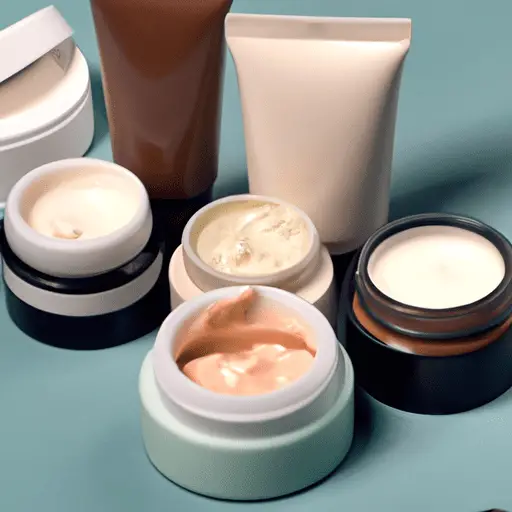-
Table of Contents
- Moisturizers for Acne-Prone Skin: Balancing Hydration and Breakouts
- Key Takeaways
- Introduction: The Importance of Moisturizing Acne-Prone Skin
- The Role of Moisturizers in Acne-Prone Skin
- Choosing the Right Moisturizer for Acne-Prone Skin
- The Importance of a Proper Skincare Routine
- FAQ Section
- 1. Can moisturizers cause acne?
- 2. Should I moisturize if I have oily skin?
- 3. What ingredients should I look for in a moisturizer for acne-prone skin?
- 4. How often should I moisturize my skin?
- 5. Can I use the same moisturizer for my face and body?
- Conclusion: Balancing Hydration and Breakouts
- Key Takeaways Revisited
- References
Moisturizers for Acne-Prone Skin: Balancing Hydration and Breakouts

[youtubomatic_search]
Key Takeaways
- Moisturizers are essential for maintaining healthy skin, even for those with acne-prone skin.
- Choosing the right moisturizer can help balance hydration and prevent breakouts.
- Non-comedogenic, oil-free, and fragrance-free moisturizers are best for acne-prone skin.
- Ingredients like hyaluronic acid, niacinamide, and salicylic acid can be beneficial for acne-prone skin.
- Proper skincare routine, including cleansing, moisturizing, and sun protection, is crucial for managing acne.
Introduction: The Importance of Moisturizing Acne-Prone Skin
Acne-prone skin is often associated with excess oil and shine, leading many to believe that moisturizing can exacerbate the problem. However, dermatologists argue that moisturizers are an essential part of a skincare routine, even for those with acne-prone skin. This article explores the importance of moisturizers for acne-prone skin, how to balance hydration and breakouts, and the best ingredients to look for in a moisturizer.
The Role of Moisturizers in Acne-Prone Skin
Moisturizers play a crucial role in maintaining the skin’s barrier function, which protects the skin from environmental stressors and prevents water loss. According to a study published in the Journal of Clinical and Aesthetic Dermatology, a damaged skin barrier can lead to increased skin sensitivity, dryness, and acne breakouts1. Therefore, even oily and acne-prone skin needs hydration to maintain a healthy skin barrier.
Choosing the Right Moisturizer for Acne-Prone Skin
Not all moisturizers are created equal, especially when it comes to acne-prone skin. Dermatologists recommend choosing non-comedogenic, oil-free, and fragrance-free moisturizers to prevent clogging pores and causing irritation2. Additionally, moisturizers with ingredients like hyaluronic acid, niacinamide, and salicylic acid can help hydrate the skin, reduce inflammation, and unclog pores, respectively.
The Importance of a Proper Skincare Routine
While choosing the right moisturizer is crucial, it’s only one part of a comprehensive skincare routine. Cleansing the skin to remove excess oil and dirt, moisturizing to maintain hydration, and protecting the skin from sun damage are all essential steps for managing acne. According to the American Academy of Dermatology, a consistent skincare routine can significantly improve acne over time3.
FAQ Section
1. Can moisturizers cause acne?
No, moisturizers themselves do not cause acne. However, certain ingredients in moisturizers can clog pores and lead to breakouts. It’s important to choose non-comedogenic and oil-free moisturizers for acne-prone skin.
2. Should I moisturize if I have oily skin?
Yes, even oily skin needs hydration. In fact, dehydrated skin can produce more oil to compensate for the lack of moisture, leading to more breakouts.
3. What ingredients should I look for in a moisturizer for acne-prone skin?
Look for ingredients like hyaluronic acid for hydration, niacinamide for reducing inflammation, and salicylic acid for unclogging pores.
4. How often should I moisturize my skin?
Dermatologists recommend moisturizing your skin twice a day, once in the morning and once at night.
5. Can I use the same moisturizer for my face and body?
It’s best to use a separate moisturizer for your face and body as the skin on your face is thinner and more sensitive than the skin on your body.
Conclusion: Balancing Hydration and Breakouts
Moisturizing is a crucial step in maintaining healthy skin, even for those with acne-prone skin. By choosing the right moisturizer and following a consistent skincare routine, it’s possible to balance hydration and prevent breakouts. Remember, skincare is not a one-size-fits-all approach, and what works for one person may not work for another. It’s always best to consult with a dermatologist or skincare professional to find the best products and routine for your skin type.
Key Takeaways Revisited
- Moisturizers are essential for maintaining a healthy skin barrier, even for acne-prone skin.
- Choosing a non-comedogenic, oil-free, and fragrance-free moisturizer can help prevent breakouts.
- Ingredients like hyaluronic acid, niacinamide, and salicylic acid can be beneficial for acne-prone skin.
- A consistent skincare routine, including cleansing, moisturizing, and sun protection, is crucial for managing acne.
- Always consult with a dermatologist or skincare professional to find the best products and routine for your skin type.
[youtubomatic_search]
References
- Proksch E, Brandner JM, Jensen JM. The skin: an indispensable barrier. Exp Dermatol. 2008;17(12):1063-1072.
- American Academy of Dermatology. “Acne: Tips for managing.” www.aad.org/public/diseases/acne/skin-care/tips. Accessed 20 Feb. 2022.
- Del Rosso JQ. The role of skin care as an integral component in the management of acne vulgaris: part 1: the importance of cleanser and moisturizer ingredients, design, and product selection. J Clin Aesthet Dermatol. 2013;6(12):19-27.

Leave a Reply